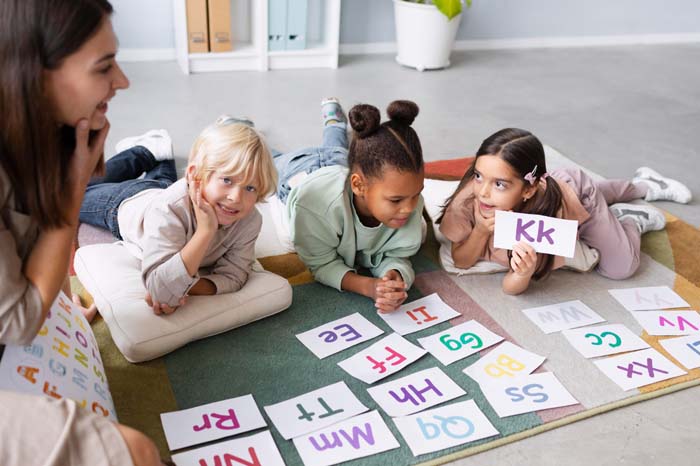A child’s learning begins as soon as they are born, their mind and learning develop quickly, and they absorb things like a sponge. Even though babies don’t start speaking till 2-3 months, their language development has already begun, as seen when they hear your voice and turn towards you or show recognition when you call out their name. This changes to ‘cooing’ and then ‘babbling’ as they observe you keenly and replicate your mouth movements.
Very soon, your little one will be able to recognize words, especially ‘mama’ and ‘dada’, and maybe a few other people around the house, like siblings, grandparents, and maybe even a family pet. Finally, they will start consciously saying recognizable words. So their language development progresses from one word in recognition to a word that expresses their needs, moving on to two words, simple sentences, and so forth.
A few Suggested Activities for Language Development that will Benefit Your Baby
1. Read to Your Baby
Help your child to enjoy reading books to them. It’s never too early to start this language development activity. As your baby grows, they will become familiar with words and their meanings and slowly begin to recognize them in real life. Modulate your voice, and make funny noises to keep the book interesting. Toddlers love listening to the same stories over and over again. As they become familiar with the stories, you can ask them to join in and fill in the missing words. Instead of reading the page, both of you can talk about what is happening on that page, and you can name something and ask them to point to that picture too. Maybe even throw in some counting too.
2. Talk to Your Baby
The more you converse with your child, the more vocabulary they are exposed to, and the better their language development. It is important to remember that even while your baby is not talking yet, they are listening, remembering, and processing what is said to them much before they start speaking. So talk to your child every opportunity you get, when changing them, giving them a bath, dressing, even when going for a walk. Children are intelligent. As they grow older, you can start having small conversations with them, giving them time to process what is being said and to respond. With practice, you can have longer conversations with them. Singing nursery rhymes is a great way to introduce new words in a fun manner.
3. Observe Your Child’s Interest
Whether at a park, during a stroll, or at home looking out of the window, observe what your child has caught your child’s attention and what excites them. Please pay attention to what they are staring at or pointing to and their facial expressions. Use this opportunity to provide details, “that is a dog. Look at it running” or “that is a red car. Maybe dada is in that car.”
4. Provide New Words and Encourage Details
When talking to your child about something that has caught their interest, you can introduce them to new words like crunchy, yummy, shiny, big, like “yes, that is your shoe, it’s a red and blue shoe”, “mmmm, carrots are crunchy”, “these are pretty and shiny beads”.
5. Use the Correct Words, Grammar, and Complete Sentences
Your child actively learns as they listen to you speak. It is advisable to refrain from using slang words or baby words as they will pick them up, also maintain consistency when referring to things, for example, calling a dog “a dog”, “doggy woggy”, or a banana, “nana”, would confuse the child as a grandparent would also be referred to as “nana”. Avoid correcting your child’s grammatical mistakes in an obvious manner, instead, repeat what they have said correctly. So if they say, “apple more want”, you repeat by saying,” Tania wants more apples”, or “would Tania like some more apples?”
6. Encourage Imagination
Give your child toys, puppets, and some dress-up props, and you can initially lead by taking on the persona of the person you have dressed up as or the puppet or toy you are holding. Tell them a familiar story using the toy or puppet, and you can give them a puppet or toy of another character in the story and help them play their part initially. Have fun putting on ‘daddy’s cap’ and talking or walking like him. Give your child a necklace, scarf, and a bag of yours, and let them act like ‘mama’ and encourage them to talk like you.
7. Play Games
Children learn best when playing, so have fun with games like “queen of Sheba “and ask your toddler to bring different things from around the house- this helps in word-object recognition and association. You can play ‘Magic bag’, bring out different things from the bag, and let them name them. The ‘telephone game’ is very useful as it will allow your child to have a conversation with you on various topics.
Helping your child with their language development need not be a daunting task. All they need is practice, and you can do any of these activities from the comfort of your home without special equipment. You don’t need to send them for any special classes. Just be consistent and regular.
EuroKids centres have a curriculum designed by a team of mothers and experts and have included various activities for kids that target and enhance children’s language development. The language activities for kids have been repeated repeatedly in different ways throughout the year, allowing them to keep practicing what they have learned. Click here to visit a centre near you. Feel free to talk to the teachers about how they develop a child’s language skills, and they will be more than happy to help.
















